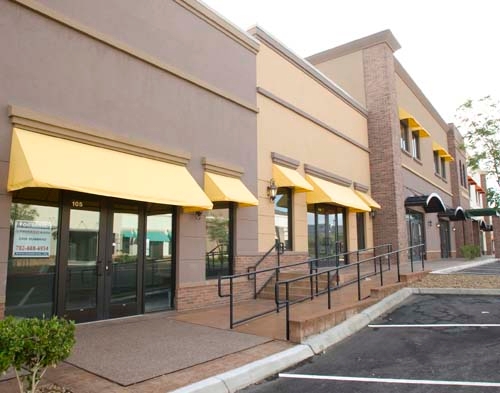Businessmen struggle with federal regulators after financial institutions fail
Think it's hard to get debt relief from struggling banks and credit unions?
Some businessmen are discovering it's even tougher to deal with the federal government about a problem loan and other legal issues after a financial institution fails.
That's the situation that Isaac Norman, a Los Angeles real estate investor, said he and his two partners, Hamid Mahban and Ali Moradshahi, have encountered.
In 2005 they borrowed $1.4 million from Ensign Federal Credit Union of Henderson and provided a 10,000-square-foot, one-story office building at 2500 W. Washington Ave. as collateral. In addition, they signed personal guarantees that made them liable if the value of the real estate was insufficient to cover the debt in case of foreclosure.
None of the partners were members of Ensign Federal Credit Union. Norman said a broker referred them to the credit union.
The property was appraised at $5 million but the value has fallen since then, he said. The partners leased the building to the state of Nevada and Clark County.
The National Credit Union Administration seized Ensign last November because the credit union was insolvent.
The county terminated its lease on the Washington Avenue office around the first of the year in a cost-saving move, Norman said. The state terminated its lease six months after the county. That left the real estate investors with a vacant property and no income to make payment on the loans.
The loan went into default, and the NCUA started foreclosure proceedings on the property, Norman said.
Norman said the partners tried to resolve the problem through negotiation.
"They turned a deaf ear to us," Norman said. "They don't care, and they just go by the book."
In addition to starting foreclosure, the agency last month filed a lawsuit in federal court, seeking to enforce the three partner's personal guarantees on the loan.
NCUA doesn't comment on pending litigation, John McKechnie, director of public and congressional affairs, said in an e-mail. However, he offered a general observation.
"Whenever a credit union failure occurs, we evaluate all outstanding obligations and make a determination as to whether to take legal action,"
McKechnie said. "This decision is based on the specific facts and circumstances in each case; there is no blanket policy on NCUA's part."
Analysts say the Federal Deposit Insurance Corp. also has an army of attorneys that is relentless in pursuit of assets of borrowers who default on loans at failed banks. As the receiver for failed banks, the FDIC seeks to recover money both for the deposit insurance fund it manages and for other creditors of busted banks.
A former FDIC attorney who spoke anonymously recalled a saying during the 1980s when numerous Texas banks became insolvent and were closed because of the oil bust: "We'll chase you down for the last hubcap on your Cadillac."
FDIC spokesman David Barr expects the agency to start filing more lawsuits against borrowers in default because of the wave of bank seizures in the last few years.
However, many times other banks acquire all the assets of the insolvent bank. In these cases, the delinquent borrower can negotiate with the bank that bought the loans, rather than the federal agency acting as receiver. The FDIC counts 297 failed banks with $627 million in assets since 2008, but the FDIC is liquidating only $34 billion in assets for closed banks.
In fact, several of the Nevada lawsuits were filed by private companies against the FDIC, rather than by the FDIC against others.
The late Gov. Kenny Guinn was a part owner of the Coronado Canyons Retail Center project, which sued Community Bank over a $29 million loan. The plaintiffs, who included the former governor's son, Jeff Guinn, signed personal guarantees that the loan would be paid.
The lawsuit claims that the bank promised to make a separate loan for tenant improvements. But the lawsuit claims that the bank later refused to lend money for those improvements.
When Community Bank became insolvent in August 2009, the FDIC took over as receiver and began liquidating assets for the benefit of its deposit insurance fund. The plaintiffs in the state court lawsuit found themselves suing the FDIC. The lawsuit was moved to federal court.
The vacant project is complete with the exception of tenant improvements.
The plaintiffs agreed to suspend the federal lawsuit while they sought relief through administrative action by the FDIC. The case remains suspended until Nov. 11 or when the FDIC reaches a decision on the plaintiffs' claims, whichever comes first.
In a separate case, construction company Collins Development in January 2008 agreed to build a bank branch for Silver State Bank in Las Vegas for $2.8 million. Silver State paid Collins $1.9 million before bank regulators shut it down in September of that year.
The FDIC failed to pay for work done at the time the project was terminated, according to Collins.
U.S. District Judge Robert Jones last December issued a summary judgment in favor of Collins, saying the construction company was entitled to compensation as a secured party. The FDIC appealed in May to the Ninth Circuit Court of Appeals.
Contact reporter John G. Edwards at jedwards
@reviewjournal.com or 702-383-0420.

















